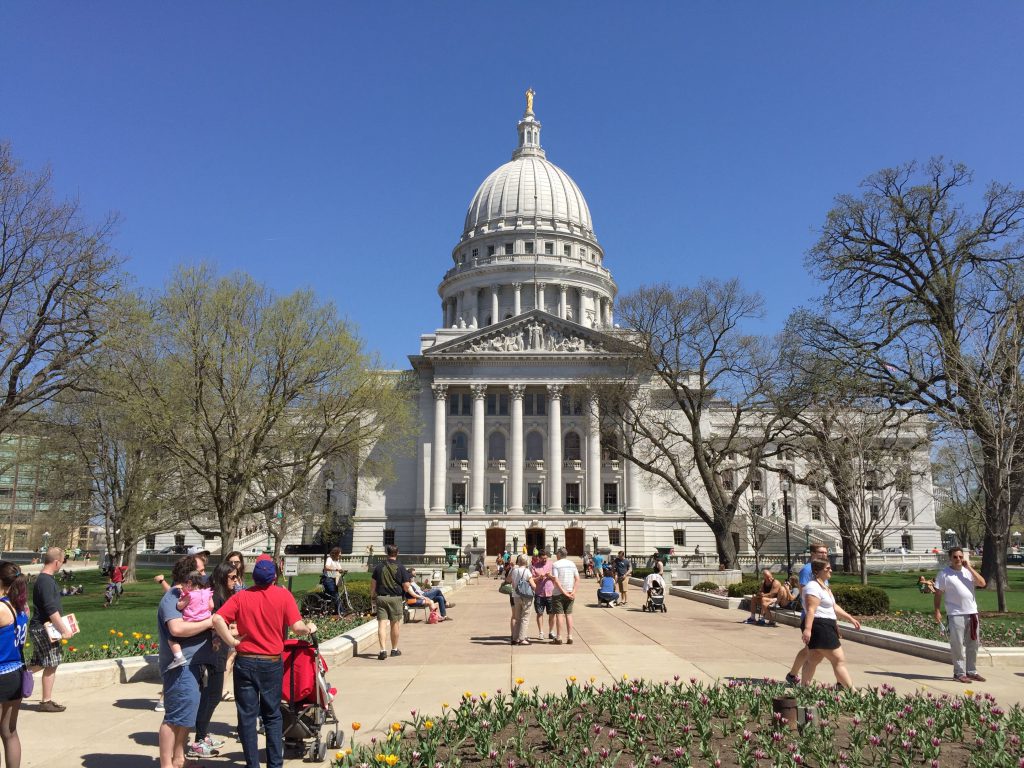New Legislative Districts Led to Bipartisan Budget
For first time in 14 years, Republican leaders needed Democratic votes.
It will not make the American Players Theatre’s stage, but this year’s Capitol version of the State Budget Deal was a five-act drama that took 18 months to cast and produce.
Act I: The Wisconsin Supreme Court’s four-justice liberal majority, in a December 2023 ruling, throws out gerrymandered legislative districts drawn by Republicans. But the Court adds this threat: If legislators and Democratic Gov. Tony Evers can’t agree on new maps, we justices will draw them.
Terrified at the prospect that justices’ maps could flip legislative control to Democrats for the first time in 14 years, Republicans agree to new district lines drawn by Evers. That put them in place for the November 2024 elections.
Act II: Running in those new districts, Democratic candidates for the Legislature make significant gains in November. When all the votes are counted, Republicans no longer have a two-thirds lock on the 33-member state Senate and Assembly Republicans are no longer only two votes away from the two-thirds needed to override Evers’ vetoes.
Instead, there are 18 Republican senators and 15 Democrats. That will be a problem for Senate Republicans as our drama proceeds.
Act III: In the spring election for an open seat on the state Supreme Court that decides whether it tilts left or right for at least two years, voters pick liberal Dane County Circuit Court Judge Susan Crawford over conservative Waukesha County Circuit Court Judge Brad Schimel, a former state attorney general. Democrats backed Crawford; Republicans supported Schimel.
Why was more than $100 million – a frightening total for what the state Constitution calls a non-partisan race – spent on that election, including at least $20 million by the Schimel-backing Elon Musk? Because the return of a conservative court majority would have threatened Democrats’ gains in the Legislature and on issues like abortion rights.
Act IV: Nearing the July 1 deadline for a new two-year state budget to be in place, Republican leaders had a big problem: Four of the 18 Senate Republicans – including Senate President Mary Felzkowski – refused to vote for it.
“The [Assembly Speaker Robin] Vos-Evers budget deal can only be described as an orgy of spending designated by two leaders that probably won’t be here to deal with the financial mess it will create,” Republican Sen. Steve Nass warned.
Balking Republican senators gives Senate Democrats deal-making leverage they hadn’t had in 14 years. If the spending priorities they shared with Evers — child care subsidies, higher K-12 school aids and more cash for the Universities of Wisconsin — were not in the final budget, none of the 15 Democrats would vote for it, dooming it in the Senate.
To get a budget, Vos and Senate Majority Leader Devin LeMahieu had to negotiate spending with wins for both sides. There were July 4 holiday parades back home to walk in, after all, and a looming change in how the federal government pays for Medicaid that had to be avoided.
“It’s a bipartisan deal,” said Senate Democratic Leader Dianne Hesselbein, one of five Democratic votes for the budget. “I think everybody left the table wishing it was different, but this is something everyone has agreed on.”
Act V: On July 1 white smoke rises at the Capitol. “I’ve always believed that what’s best for our kids is what’s best for our state, and today, after three months of negotiations, I’m proud to be announcing a bipartisan budget agreement that delivers on that promise,” Evers says in a statement issued at 5 a.m.
Republicans said they got their top priority — a $1.3-billion income tax cut that will most help middle-income families and retirees — while agreeing to help child care centers statewide about to lose federal aid.
“This isn’t a budget that, if (Republicans) had all three branches, that we would have adopted, right? But it is a reasonable, good compromise budget,” said Vos.
In the Assembly, 53 Republicans and six Democrats pass the budget. One Republican – Rep. Scott Allen – and 38 Democrats vote against it.
The budget raises total state spending by mid-2027 by 12% – an increase paid for by drawing down the $4.3-billion surplus. It boosts spending for the UW system by $256 million, child care spending by $300 million and K-12 school aids by $1.4 billion.
If State Budget Deal was an American Players Theatre production, it wouldn’t get a standing ovation from the audience. More likely a round of polite — but bipartisan — applause.
Steven Walters started covering the Capitol in 1988. Contact him a stevenscotwalters@gmail.com
If you think stories like this are important, become a member of Urban Milwaukee and help support real, independent journalism. Plus you get some cool added benefits.
The State of Politics
-
A Wisconsin Political Trivia Quiz
 Dec 15th, 2025 by Steven Walters
Dec 15th, 2025 by Steven Walters
-
The Fight Over Wisconsin’s House Districts
 Dec 8th, 2025 by Steven Walters
Dec 8th, 2025 by Steven Walters
-
The Battle Over On-Line Betting
 Nov 24th, 2025 by Steven Walters
Nov 24th, 2025 by Steven Walters























Excellent recap, cleverly done.